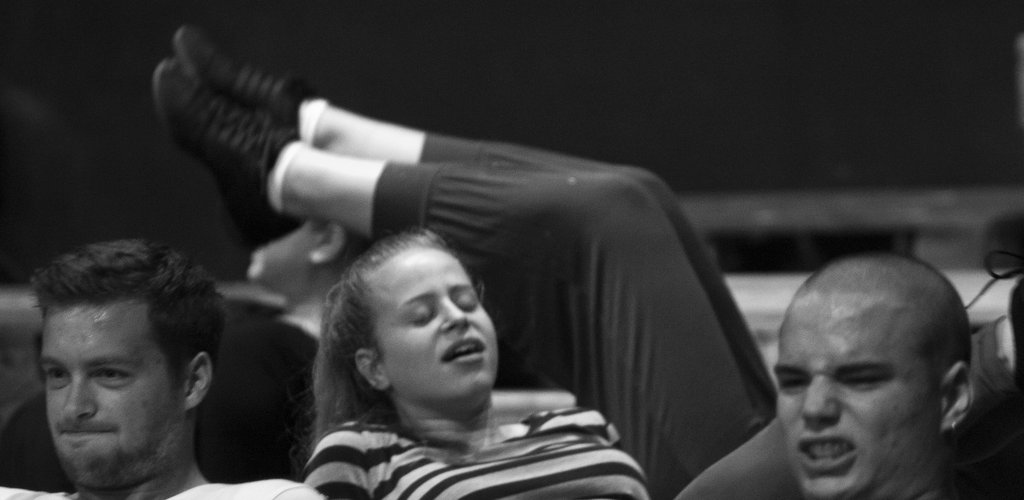The music of Kurt Weill (1900-1950) is “simple and popular” (“einfach und volkstümlich”, as the composer put it) without being primitive or lacking invention. And “simple” music – though quite refined – should have a simple story, yet the lyrics by Bertolt Brecht (1898-1956) are illuminating in several ways.
The plot of the school opera (“Schuloper”), which was originally intended to be performed by pupils, is based on a Japanese Nō drama from the 15th century – once a Buddhist tale – which the composer came to know in Elisabeth Hauptmann’s translation and recommended Brecht adapt the story. Weill summarised the plot of Der Jasager in an interview from 1930 as follows: “The protagonist is a boy, who wants to join his teacher in a journey to get medicine from the town for his sick mother. The journey is dangerous, and the mother would not let him go. Even the teacher tries to dissuade him. Yet the boy strides off to help his ill mother. By the time the company arrives at the most dangerous place, the boy suddenly becomes exhausted, putting everyone in danger on the way. The boy is offered a choice: they can turn back or follow the old custom of casting the sick into the valley. The boy opted for the latter. »He said yes« – sings the choir.
Compared to the original Japanese text, Brecht changed the motivation here and there... The motivation through medicine the boy wants to get to save his sick mother was also made up by Brecht... First and foremost, new features were introduced to the piece to teach pupils something. This is why we included the sentence concerning consent. »The science of consent is the first of all the things to learn.« This is what pupils should learn. They should know that the community one joins requires individuals to draw certain conclusions. The boy follows the community’s course when he says yes to being cast into the valley... This tendency of »consent« gives political substance to the teaching-piece, which nevertheless has nothing to do with party politics, of course.” (Kurt Weill’s words from the 1930/I issue of the Musikpflege journal were originally translated into Hungarian by János Weiss.)
We should not sincerely believe Kurt Weill that the moral of The Yes Sayer “has nothing to do with party politics, of course”... Since only six months after the Brecht/Weill piece premiered, another teaching-piece by Brecht debuted in Berlin, with Hanns Eisler (1898-1962) the composer this time. It was entitled “The Decision” (Die Maßnahme), and according to the plot, communist agitators are forced to kill their young comrade after he – being too humanist – constantly put the revolutionary mission of the others in danger. A key moment here as well is when the young comrade agrees to the “decision” made by the others...
Due to widespread misunderstandings about the “moral” of the teaching-piece entitled The Decision, Brecht and Eisler had no choice but to ban their own play from public performance. (Sometimes, however, an exception is made, just like some years ago in Vienna. It would be worth performing The Decision in Hungary as well, since Eisler is not a less important composer than Weill, just less frequently played...). In light of all this, Brecht felt the need to write the companion play of Der Jasager, which is Der Neinsager (“He Said No”). In this piece the boy disagrees with being cast into the valley, after which his companions concede that the boy acting against the community interest is not wrong if the community interest was formulated wrongly.
Although no music was composed for Der Neinsager, those who managed the production at the Festival Theatre still decided to perform it with the music of Der Jasager. This was a clever idea, because in this way the topicality of the parabolic piece becomes clear and unambiguous. The Yes Sayer is particularly topical where and when the minority is expected to conform to the majority (or another minority shown as the majority) at all costs...The Yes Sayer is still topical where human or personal rights are violated anywhere in the interests of a group, society, nation or country.
Second-year students of the University of Theatre Arts – especially Dávid Vizi (Teacher), Balázs Szántó (Boy) and Lilla Kádár (Mother) – performed the Brecht/Weill school opera in a disciplined and clear manner (also singing clearly!). As the friendly retired piano teacher sitting next to me rightly put it: it was quite refreshing to hear something different from operatic vocal production...


